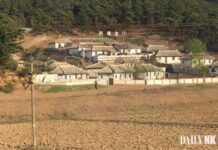North Korean leader Kim Jong Un’s sister, Kim Yo Jong, is leading an effort to pay out stipends aimed at encouraging North Koreans to have more children, a story first reported by North Korean state-run outlet Naenara.
“Comrade Kim Yo Jong ordered the Cabinet to send up a petition [to Kim Jong Un] about the stipend scheme,” a source in North Korea told Daily NK on Wednesday. “Things moved forward when Kim gave his approval.”
Daily NK reported recently that Kim Yo Jong has also been credited with gifting medicine to new mothers at a hospital in Pyongyang. The stipend seems to be part of a broader strategy to show her “love of the people.”
“The stipend scheme is aimed at boosting trust in the socialist healthcare system with a view to encourage people to have more children, while also providing support for young children who, of course, are vulnerable to contagious diseases,” the source said. “Families with children under five years old received KPW 7,500 each.”
Indeed, the stipend appears to have come in response to growing numbers of North Korean families avoiding having children due to economic difficulties and high child rearing costs. The stipend may also be considered a kind of “disaster relief payment” stemming from difficulties due to COVID-19.
SMALL IN VALUE
The stipends are, however, quite small when compared with what the South Korean government has given to families with children.
The South Korean government has issued families with childcare coupons worth some KRW 400,000 per child. The country also provides support to families to pay for childcare services, among other benefits.
Daily NK’s source said, however, that while North Korea’s stipends “may be small, they are the first such financial incentives [to encourage people to have more children] the state has given out in a long time.“
Yet, he pointed out that “many households are unhappy that the stipends are so small in value” and that “the stipend is enough to purchase 1.8 kilograms of rice, so it will only help families feed themselves for a couple of days.”
In Pyongyang, one kilogram of rice costs KPW 4,100 (as of July 1). Currently, one USD is equivalent to KPW 8,300, which means the value of the stipend is less than one American dollar.
Even more troubling is the fact that the stipend has only been given out to a small portion of North Koreans living in urban areas.
“The stipend was not paid to citizens nationwide,” the source confirmed, adding, “It was mainly given to people in Pyongyang. In areas outside the capital, only families with both parents working for state-run businesses received it.”
From June 15, local district offices and inminbans (North Korea’s lowest administrative unit), under the leadership of local people’s committees, started to put together lists of beneficiaries of the stipends based on birth records held by the Ministry of Social Security, according to the source.
“This job took a month, and the stipend was paid after local district offices and police stations checked the lists one more time,” the source added.
THE ELDERLY IN, SINGLE-PARENT FAMILIES OUT
The source did report, however, that “children born out of wedlock or whose birth papers were not registered with the police are ineligible for the stipend – even if they are under the age of five.”
In North Korea, single parents cannot register births of children. These children are excluded from receiving certain benefits, including nominally free education.
Daily NK understands that the stipend was also paid to elderly people in the country.
“Senior citizens also received KPW 7,500 from the government during the same period the other stipends were handed out,” the source said, adding, “Again, these stipends were only handed out to [elderly people] in Pyongyang and the seats of provincial governments.”
Please direct any comments or questions about this article to dailynkenglish@uni-media.net.
















